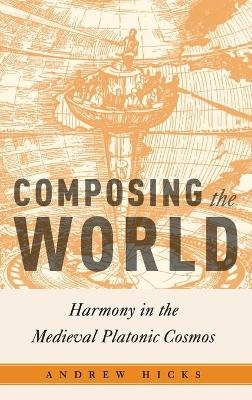
Composing the World
Oxford University Press Inc (Verlag)
978-0-19-065820-5 (ISBN)
Taking in hand this current "discovery" that we can listen to the cosmos, Andrew Hicks argues that sound--and the harmonious coordination of sounds, sources, and listeners--has always been an integral part of the history of studying the cosmos. Composing the World charts one constellation of musical metaphors, analogies, and expressive modalities embedded within a late-ancient and medieval cosmological discourse: that of a cosmos animated and choreographed according to a specifically musical aesthetic. The specific historical terrain of Hicks' discussion centers upon the world of twelfth-century philosophy, and from there he offers a new intellectual history of the role of harmony in medieval cosmological discourse, a discourse which itself focused on the reception and development of Platonism.
Hicks illuminates how a cosmological aesthetics based on the "music of the spheres" both governed the moral, physical, and psychic equilibrium of the human, and assured the coherence of the universe as a whole. With a rare convergence of musicological, philosophical, and philological rigor, Hicks presents a narrative tour through medieval cosmology with reflections on important philosophical movements along the way, raising connections to Cartesian dualism, Uexküll's theoretical biology, and Deleuze and Guattari's musically inspired language of milieus and (de)territorialization. Hicks ultimately suggests that the models of musical cosmology popular in late antiquity and the twelfth century are relevant to our modern philosophical and scientific undertakings. Impeccably researched and beautifully written, Composing the World will resonate with a variety of readers, and it encourages us to rethink the role of music and sound within our greater understanding of the universe.
Andrew Hicks is an Assistant Professor of Music and Medieval Studies at Cornell University, a member of the graduate fields of Classics and Near Eastern Studies, and a faculty affiliate in Religious Studies. His scholarship clusters around the intellectual history of musical thought from a cross-disciplinary perspective that embraces philosophical, cosmological, scientific, and grammatical discourse in Late Antiquity and the Middle Ages, and spans the linguistic and cultural spheres of Latin, Greek, Persian, and Arabic.
Contents
List of Illustrations
Series Editors' Foreword
Abbreviations
Acknowledgements
About the Companion Website
PRELUDE: Listening to the Universe
PART ONE: The Framework
1. Harmonizing the World: Natural Philosophy and Order
2. Knowing the World: Music, Mathematics, and Physics
PART TWO: The Particulars
3. Composing the Human: Harmonies of the Microcosm
4. Hearing the World: Sonic Materialisms
5. Composing the Cosmic: Harmonies of the Macrocosm
POSTLUDE: The Musical Aesthetics of a World So Composed
Appendix One: William of Conches, Glosulae de magno Prisciano
Appendix Two: Hisdosus, De anima mundi Platonica
Works Cited
Index
| Erscheinungsdatum | 14.01.2017 |
|---|---|
| Reihe/Serie | Critical Conjunctures in Music and Sound |
| Verlagsort | New York |
| Sprache | englisch |
| Maße | 155 x 239 mm |
| Gewicht | 590 g |
| Themenwelt | Kunst / Musik / Theater ► Musik ► Klassik / Oper / Musical |
| Geschichte ► Teilgebiete der Geschichte ► Kulturgeschichte | |
| Geisteswissenschaften ► Philosophie ► Philosophie des Mittelalters | |
| ISBN-10 | 0-19-065820-7 / 0190658207 |
| ISBN-13 | 978-0-19-065820-5 / 9780190658205 |
| Zustand | Neuware |
| Haben Sie eine Frage zum Produkt? |
aus dem Bereich


